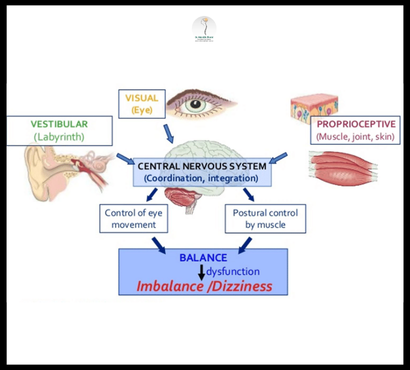Balance and coordination depend on a synergy between your brain, inner ears, sensory nerves, muscles, and vision. When this complex system falters, you may experience dizziness, stumbling, or poor limb control— which may range from mild annoyances to signs of serious nervous system damage. This guide explains how balance works, common warning signs, possible causes, and modern evaluation and rehab strategies.
2. How Balance and Coordination Work
Your body’s postural control relies on three primary systems:
- Vestibular system (inner ear) – Detects head motion
- Proprioceptive input (nerves in muscles/joints) – Provides information on body position
- Vision – Offers orientation cues
These converge in the cerebellum and brainstem, integrating signals and coordinating movements. Damage anywhere—ear, nerves, brain—can disrupt this harmony
3. Common Symptoms of Dysfunction
- Dizziness or vertigo (spinning)
- Unsteadiness, stumbling, falls
- Poor coordination—clumsiness in limbs
- Nystagmus (eye movements) or blurred vision
- Lightheadedness or feeling faint
If symptoms are persistent, recurrent, or worsen, an evaluation is vital.
4. Underlying Causes
| System Affected | Common Conditions |
| Vestibular (inner ear) | BPPV, ear infections, Meniere’s disease, vestibulocerebellar syndrome |
| Peripheral nerves | Diabetic neuropathy, chemo toxicity, vitamin deficiency |
| Brain/Cerebellum | Stroke, multiple sclerosis, ataxia, cerebellar degeneration, tumors |
| Spine | Spinal stenosis or cord compression leading to myelopathy |
| Systemic | Low BP, dehydration, medications, heart issues |
5. Warning Signs That Require Doctor’s Visit
Seek prompt care if you experience:
- Sudden unsteadiness or falls
- Persistent dizziness for days
- Double vision or slurred speech
- Sudden limb weakness or numbness
- Chest pain or fainting with symptoms
6. Diagnosing the Cause
A. Clinical History & Physical Exam
Your doctor will note onset, triggers, duration, and associated symptoms.
B. Specialist Tests
- Vestibular exams: Dix-Hallpike, vHIT, ENG/VNG
- Nerve exams: EMG for neuropathy
- Imaging: MRI/CT for brain/spine conditions
- Lab tests: Blood pressure, diabetes screen, vitamin B12
7. Treatment & Rehabilitation
A. Treat Underlying Cause
- Vestibular disorders: Canalith repositioning, inner ear medication
- Peripheral neuropathy: Control diabetes, treat vitamin deficiencies
- Cerebellar issues: Focused on cause; may include medication or surgery
B. Vestibular Rehabilitation Therapy (VRT)
Targeted balance exercises to retrain the brain—3-4 sessions/week typically.
C. Physical Therapy for Coordination
Strength and gait training significantly reduce falls and improve stability.
D. Lifestyle Adjustments
Adequate hydration, gradual posture changes, visual correction, avoiding triggers, and safe home environments.
8. Prognosis & Preventing Falls
- Recovery varies by cause—inner ear disorders often improve quickly, cerebellar issues more gradually
- Long-term physical or vestibular therapy offers sustained benefits
- Fall prevention includes removing tripping hazards, using support rails, and steady footwear
Balance and coordination arise from a finely tuned system involving your inner ears, nerves, muscles, vision, and brain. Disruption in any part can cause dizziness, clumsiness, or falls. Most causes—be it BPPV, neuropathy, or mild cerebellar issues—respond well to rehab and lifestyle changes. More serious symptoms require medical evaluation. If you or a loved one experiences persistent imbalance, don’t delay—visit a neurologist for timely care and regain confidence in movement.
FAQs
Q1. Is poor balance always neurological?
Not always—causes range from inner ear issues and low blood pressure to neuropathy. Persistent or progressive unsteadiness needs evaluation.
Q2. How effective is vestibular rehabilitation therapy?
VRT is highly successful—studies show 70–80% of patients regain balance and reduce dizziness with consistent exercise
Q3. Can diabetic neuropathy affect coordination?
Yes—damage to sensory nerves in feet makes balance challenging. Controlling blood sugar and physiotherapy helps improve stability .

